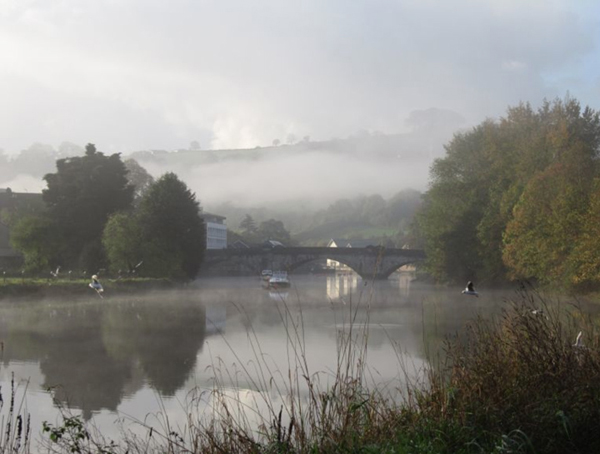Government support for the rebuilding of our communities is inadequate, but the Transition movement is stepping into the breach. [7 February 2012 | Peter Boyer]

Totnes, a market town in Devon, UK. Transition Town Totnes is a dynamic, community-led organisation that serves its members by strengthening the local economy, reducing the cost of living and preparing for a future with less oil and a changing climate (Photo TTT)
There are an awful lot of ways we can go about reducing our carbon pollution. We can rely on governments to impose various measures from above, or we can do any number of things as individuals, like use less electricity or do less travelling.
There’s also a middle path, neither government nor individual. It’s the way of community.
“Community” is a well-worn word these days, used for any number of human collectives including cities, metropolises and even nations. You’ll even frequently hear reference to the “global community”, implying that we’re all in it together.
Fair enough, but to me the word works best in a more intimate sense. People you know or rub shoulders with regularly, all living in a defined setting, belonging to each other in some sort of way, acknowledging a common identity and purpose — that’s community.
For all the talk about communities, their road of late has been a rocky one. Like other Western countries, Australia in the second half of the 20th century saw the concept of community being displaced by notions such as personal space, liberty, free expression, privacy, individual rights.
Community and personal space are not mutually exclusive, but focusing on one tends to diminish the other, which is what’s been happening to local neighbourhoods ever since the rise of the family car and its costly appurtenances (roads and parking lots, expanding suburbs and drive-in shopping).
Urban life today is shaped by personal needs, by the likes of personal transport, personal workspaces and personal entertainment. We come together (though decreasingly so) in our workplaces and at scheduled events like meetings or sporting fixtures, but in the main we live solitary lives with most social contact limited to family, work colleagues or close friends.
This is why the world-wide Transition Movement is so valuable. In seeking to change the way we think about ourselves and our planet, it has become a force for rebuilding our long-neglected communities.
Transition began when people in Totnes, a market town in Devonshire, UK, came together in 2001 to work out practical responses to the energy challenges triggered by inevitably declining oil supplies and the climate problems created by carbon pollution.
Over the years it’s grown, both within Totnes and in the wider world to encompass a wholesale re-shaping of communities and what we mean by them. Transition’s purview now incorporates whole new ways of designing and using our community infrastructures — the buildings, streets and spaces in which people live, work and play.
Halfway across the world, in Tasmania, the Transition movement is taking root. Groups of people in communities as diverse as South and West Hobart, Launceston, Burnie, Sandy Bay, Kingston, Woodbridge, Molesworth and New Norfolk are working to change how we see ourselves and interact with each other.
Some of them are just beginning, putting out feelers at the start of what will be a long process. Others such as the South Hobart and Waterworks communities are well under way with an array of schemes including solar hot water bulk purchases and community food gardens.
Slowly, steadily, they are building their collective experience, creating wellsprings of expertise and wisdom that will inform others starting their own long journeys of transition.
Along the way there are real practical benefits. Rachel Roddam, a Transition enthusiast based in Molesworth, reports that a Transition network’s alert about a tip shop selling apple trees for $2 each led to hundreds of trees being bought and dispersed around a number of communities.
As Roddam says, all such little events can help create a shift in community sentiment, part of a growing stream moving us towards a more sustainable existence. We have to applaud this and the effort behind it, but we also have to acknowledge it’s a tiny fraction of what’s really needed.
We won’t get a significant shift in our carbon emission levels without widespread and deep changes in the way we live our lives, including what and how much we consume, where we buy it and where it comes from, and how we use and conserve our electricity and transport fuel.
Canberra offers some community support — funding for councils, groups and low-income households to conserve energy in homes and other buildings, and a rebate to install rooftop water heating systems — with much more to come from July under the “Clean Energy Future” program.
The Tasmanian Climate Change Office website tells us that getting involved in Transition activities will be good for everyone involved. It provides some excellent advice from my valued colleague Chris Harries about how just three people can “spark” a community into action and make it “creative, sociable, satisfying and healthy” for all.
Now the Kingborough Council has given its backing to a visit by UK Transition consultant Adrian Porter, co-manager of a new Totnes initiative, Transition Streets, to discuss how this idea might work for Kingston. The involvement of local government is heartening to see.
But it’s far from enough. Governments see Transition as a means of getting things to happen at no cost to them. But volunteers can manage only so much. We need big, rapid changes with strong, sustained backing from committed governments. We’re a long way from that.
• Adrian Porter, from Totnes, UK, will discuss how Totnes ideas can work for Kingston at a public meeting tomorrow, 7 pm, Twin Ovals Function Centre, Lightwood Drive, off Kingston View Drive.
